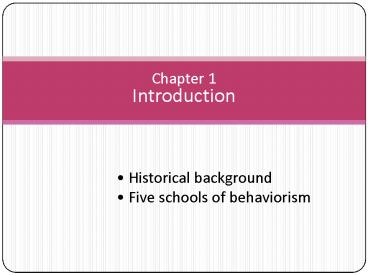Chapter 1 Introduction - PowerPoint PPT Presentation
1 / 15
Title:
Chapter 1 Introduction
Description:
Impact: Scientists more skeptical of mental processes in animals. But... Provided proof that animals were capable of learning. Clever Hans, the clever horse ... – PowerPoint PPT presentation
Number of Views:47
Avg rating:3.0/5.0
Title: Chapter 1 Introduction
1
Chapter 1Introduction
- Historical background
- Five schools of behaviorism
2
Defining Learning
- a relatively permanent change in knowledge or
behavior that results from experience. - (behavior any activity that can be either
directly or indirectly observed)
3
Two Basic Types of Learning
- Classical conditioning
- Process by which an inborn, involuntary behavior
is produced in new situations
4
Two Basic Types of Learning
- Operant conditioning
- Strengthening or weakening of a voluntary
behavior because of its consequences
Food
Scolding
Behavior Increases or decreases
Behavior (dog sits)
Nothing
Praise
Reinforcers
5
Skinner Box (Conditioning Box)
6
Sniffy the Virtual Rat
7
Historical Background
- Aristotle (382-322 BC)
- Law of similarity
- Law of contrast
- Law of contiguity
- Law of frequency
8
Historical Background
- Descartes
- Mind-body dualism
- British empiricists
- Tabula rasa
9
Historical Background
- Structuralism
- Introspection
- Functionalism
10
Clever Hans, the clever horse
- von Ostens goal prove humans and animals have
similar mental processes
11
Clever Hans, the clever horse An Investigation
- Used experimental approach
- 2 groups of questioners
- Group 1 knew the answers
- Group 2 did not know the answers
- Hans only answered correctly when questioners
knew the answers
12
Clever Hans, the clever horse An Investigation
- Conclusion
- Hans was receiving some type of information from
questioners - Hans had been unintentionally conditioned by his
owner - Impact
- Scientists more skeptical of mental processes in
animals - But
- Provided proof that animals were capable of
learning
13
Historical Background
- Behaviorism
- Watson
- 1913 Watson declared war
- Dealt solely with observable behavior
- Rejected mentalistic concepts
- Goal prediction and control of behavior
- 1924 Watsonian behaviorism preeminent in US
- Law of parsimony
14
Watsons Life (1878-1958)
- 1920 Scandal
- Affair with student Rosalie Rayner
- Watson forced to resign
- Moved into advertising
15
Five schools of behaviorism
- Watsonian behaviorism
- Neobehaviorism Hull
- Intervening variables
- Cognitive Neobehaviorism Tolman
- Cognitive map
- Latent learning
- Social Learning Theory Bandura
- Reciprocal determinism
- Radical Behaviorism Skinner































